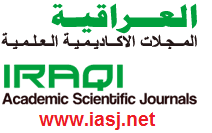Shear Bond Strength of Different Artificial Acrylic Teeth to Acrylic Denture Base After Thermal Cycling
Abstract
Purpose: To ascertain how three distinct heat cycling times affected the acrylic teeth's shear bond strength to the acrylic denture base, both in the control group (did not undergo thermal cycling) and in the experimental group. Methods: The specimens number were (80) divided into four groups according to different manufacturers of acrylic artificial teeth which include: Group (I) Iraqi teeth(Karbala, Iraq), Group (II) Syria teeth(Saief Set teeth, Syria), Group (III) Chinese teeth(Dental8, China) and Group (IV) Italian teeth (Acryl Lux, Italian), these groups were further divided into four groups based on how long they were allowed to thermal cycleone week, one month, and two months in distilled water, where each subdivided group contain five samples. The acrylic resin of denture base used was (Ivoclar Vivadent, Germany). The shear test was conducted using a Universal testing machine (Instron Model 1332 Servo Hydraulic Fatigue Test System 100kN Load Cell 2513-502) following different heat cycles (70, 300, and 600 cycles) at a daily rate of ten cycles with alternating manual thermal cycling between at +5 + 2C and 55 + 2C by the use of manual thermal cycling machine (Ready made, Iraq). Results: The results showed that, the control group had the highest value of shear strength compared to other thermal cycling groups and the value of shear strength was the highest following a week of thermal cycling. Also there were significant differences between the four groups under study as well as across all periods. Conclusion: Artificial acrylic teeth's shear strength is negatively impacted by heat cycling when compared to acrylic denture bases of control and specimens heated for three distinct lengths of time. Compared to samples heated to a constant temperature, control specimens had a stronger shear bond.











